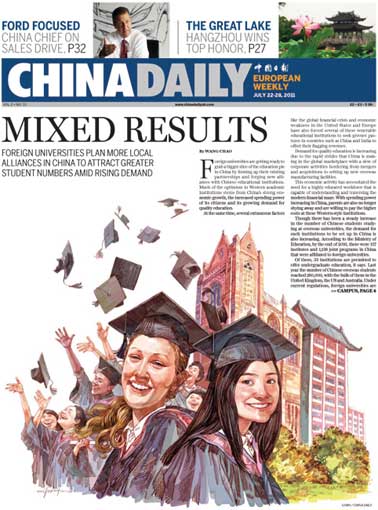Lenovo's challenge: i can, too
Updated: 2011-06-17 11:56
By He Wei and Li Luxiang (China Daily European Weekly)
Overseas expansion
On June 1, Lenovo announced it will pay up to $666 million (469 million euros) for a majority stake of German consumer electronics maker Medion.
The acquisition, Lenovo's biggest since it bought IBM's PC business in 2005, would boost Lenovo's PC market share in Germany to 14 percent and in western Europe to 7.5 percent, taking Apple's fourth place in the market share of the region.
The acquisition was in line with Lenovo's global expansion ambition in developed overseas markets. Just five months ago, Lenovo announced it was forming a joint venture with NEC, with Lenovo taking a 51 percent ownership in the new venture, a move that enabled it to establish a firm foothold in the Japanese market.
The Medion deal was an apparent challenge to Acer, which currently accounts for the lion's share of the European PC market. But other than a trophy to stroke the corporate ego, Jiang does not foresee much benefits.
"Lenovo is likely to witness a rise in revenue and market share in the short term, but it does not necessarily lead to a high profit margin and may even face deficits. While the previous bid for ThinkPad was about access to the US market, ample evidence shows the Asia-Pacific region remains the ultimate driving force," Jiang says.
The flurry of overseas acquisitions and joint ventures has brought back memories of the company's earlier problems of integration after its purchase of IBM's PC business.
After Lenovo took over IBM, Yang Yuanqing was appointed chairman of the board and William Amelio, who previously worked for Dell, was invited to be Lenovo's CEO. The move aimed to combine Yang's expertise in the domestic market with Amelio's overseas experience.
However, a corporate cultural conflict brought about by a foreign management style and local staff distracted Lenovo from making bold innovations and strategic shifts in the fast changing global economy.
The management reshuffle that followed Lenovo's worst performance in 2009 not only welcomed Liu back to the top job, but also led to the replacement of William Amelio with Yang.
The dream team of Liu and Yang brought an end to Lenovo's falling sales and boosted corporate morale that had suffered under the previous regime.
Lenovo also restored company confidence by developing a consistent corporate strategy.
"The company is now configured to be internationalized, from its employees, to its management style," Wang says.
Lenovo has overcome the traditional dichotomy of domestic and overseas markets, and is eyeing a new form of divide: developed markets and emerging markets.
"As for advanced economies, Lenovo has and will continue to proceed with mergers and acquisitions, especially in areas where market share remains limited. For emerging economies, all that matters is to tap into the market and make a strong presence," Wang says.
Challenges ahead
Experts agree a lack of technological breakthroughs is Lenovo's Achilles' heel.
For Lenovo, software development has lagged behind rivals. Wang predicts a merger or acquisition to address this is on its way.
Apple has dwarfed Lenovo with its intangible, yet crucial, customer experience, both before and after the purchase. Jiang says Apple's applications are markedly more user-friendly than most its competitors, including that of Lenovo.
"LeOS, Lenovo's operating system, lacks genuine innovation, and has yet to achieve software compatibility. Compared with iOS, its business-oriented applications are still in their infancy," Jiang says.
In addition, "many consumers simply don't really care whether they are iPhones or LePhones, iPads or LePads. What they care about are Internet surfing, music, e-mail and the associated services that go with them. Therefore, what matters is the experience they go through in buying these products and the service they receive after the purchase."
Along with an attractive style, an appealing global branding image is also a must for Lenovo, which, unlike Apple, is not yet a household name.
The New York Times reported that Lenovo partnered with Saatchi & Saatchi, part of the French multinational advertising and communications Publicis Groupe, in January, to spend $100 million on a new advertising campaign that began in May.
Wang says Lenovo has veered away from a product-driven strategy to pursue an ideal-oriented notion in order to make Lenovo a household name.
But according to Jiang, Lenovo appears hesitant on the trade-off between business expansion and technology breakthrough, and this has been a consistent strategic divergence that has long crippled its development.
"Lenovo started from trade and assembling, and excelled at them. It is no easy task to throw off this sheer inertia," Jiang says.
The critic adds: "Despite churning out a full range of products within a limited time frame, Lenovo has been emulating Apple's approach all the time."
Lenovo could also be in trouble on its home turf. Analyst Brian White of Ticonderoga believes China is in the early stages of catching "Apple fever".
"What we need is Apple's global brand loyalty and the strong team of applications suppliers behind it," Liu Jun, the company's mobile Internet and digital group president, once said.
But Rome was not built in a day. "To win the hearts of Apple evangelists, who do not bother to haggle over prices and who worship Steve Jobs, is not within Lenovo's reach right now," Jiang says.
E-paper

Ringing success
Domestic firms make hay as shopping spree by middle class consumers keeps cash registers ringing in Nanjing
Mixed Results
Crowning achievement
Living happily ever after
Specials

Ciao, Yao
Yao Ming announced his retirement from basketball, staging an emotional end to a glorious career.

Going the distance
British fitness coach comes to terms with tragedy through life changes

Turning up the heat
Traditional Chinese medicine using moxa, or mugwort herb, is once again becoming fashionable
